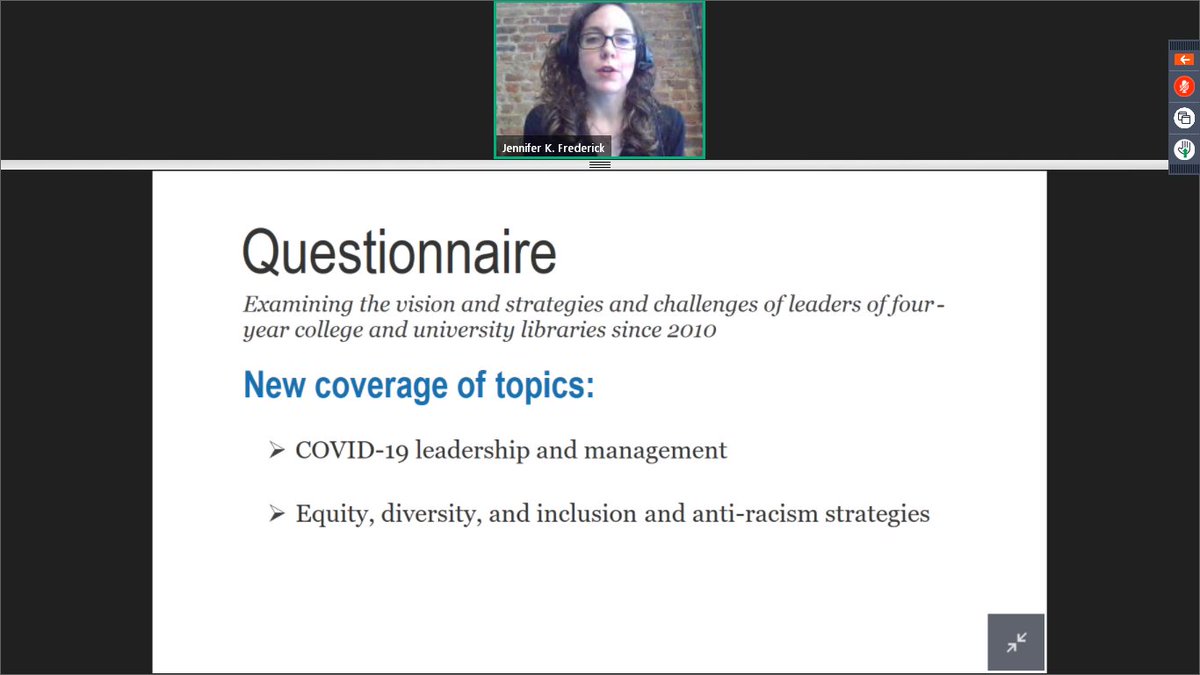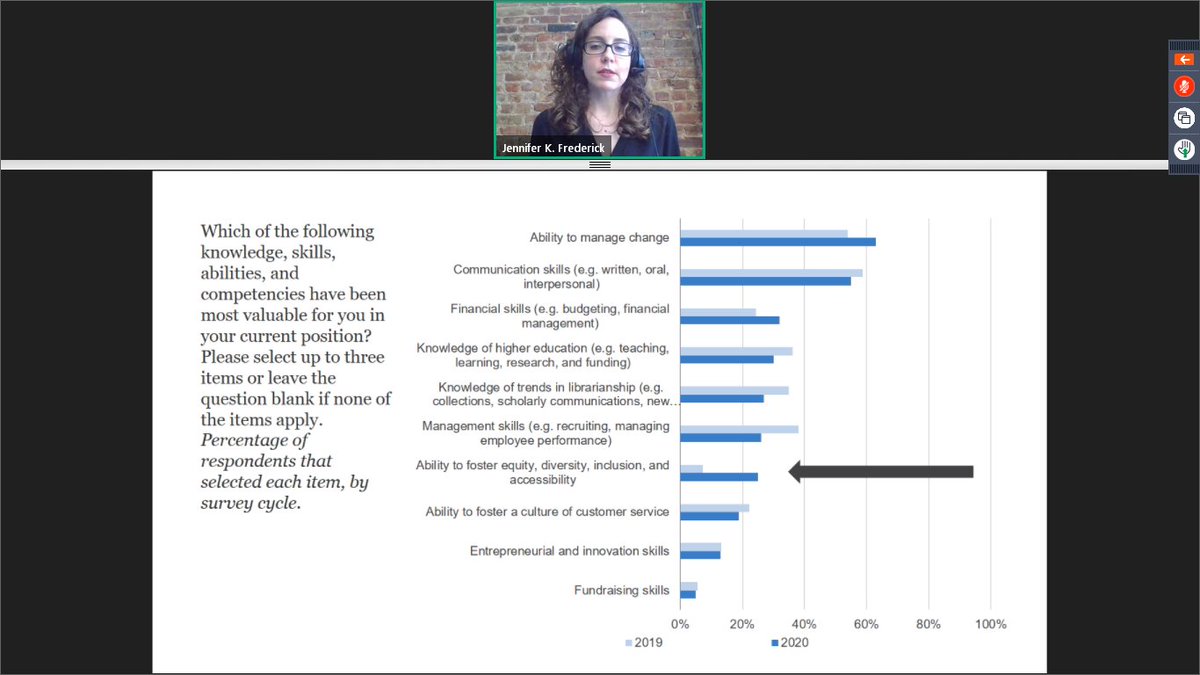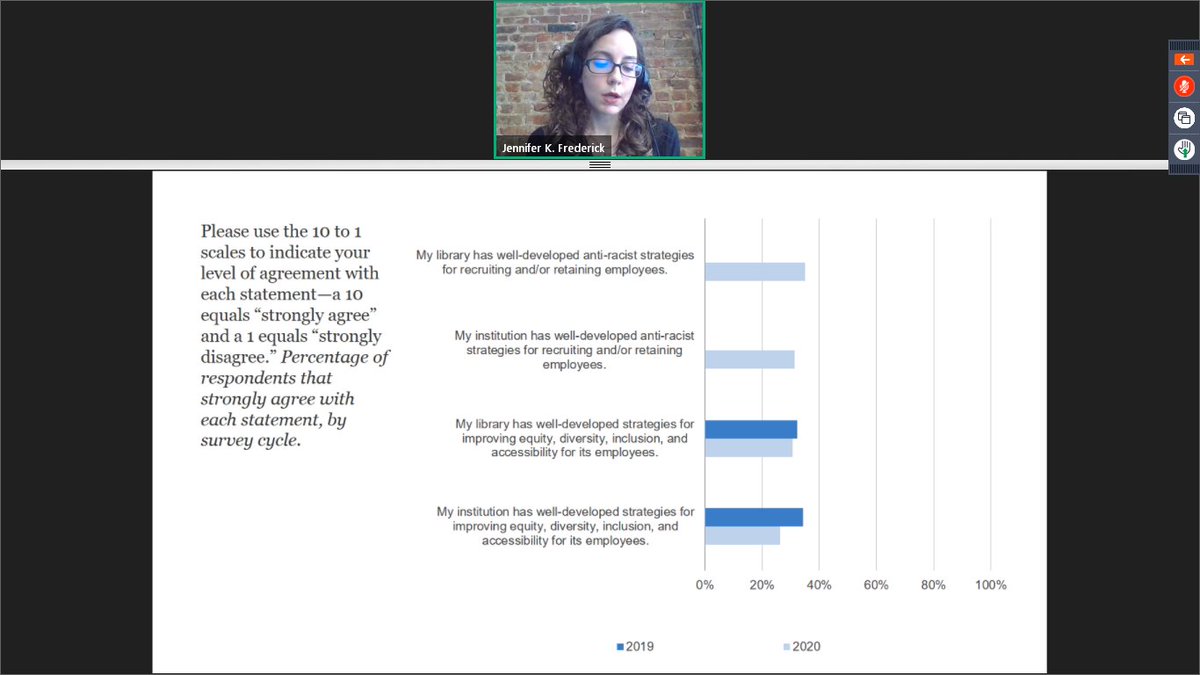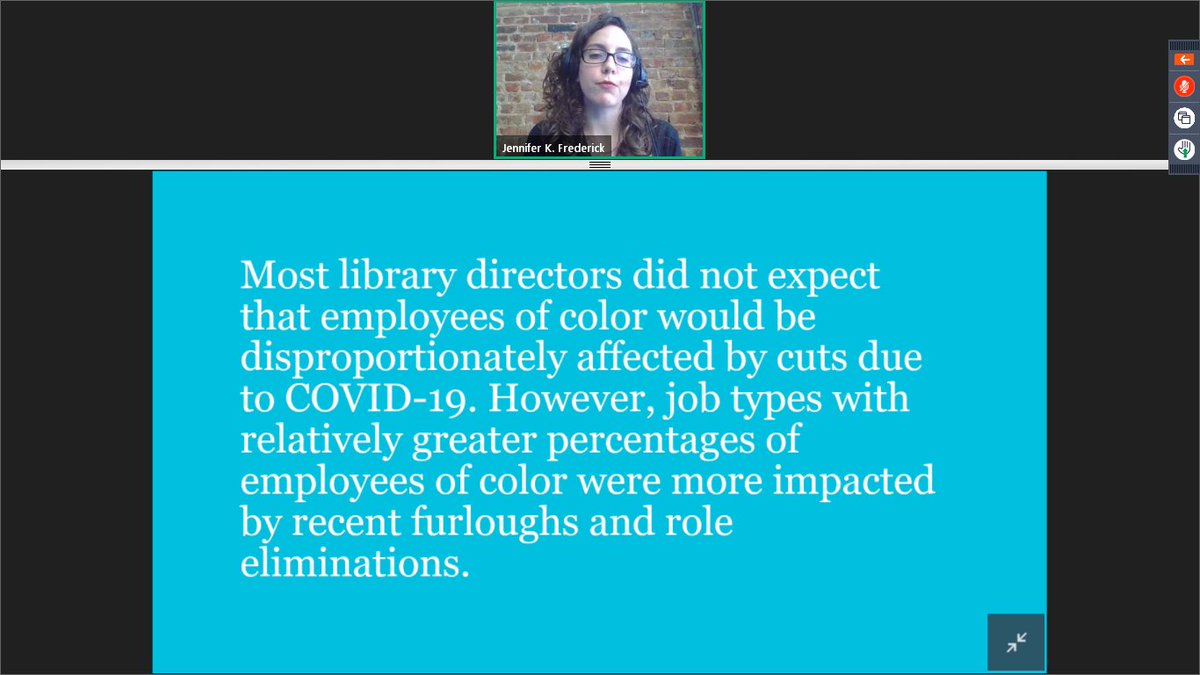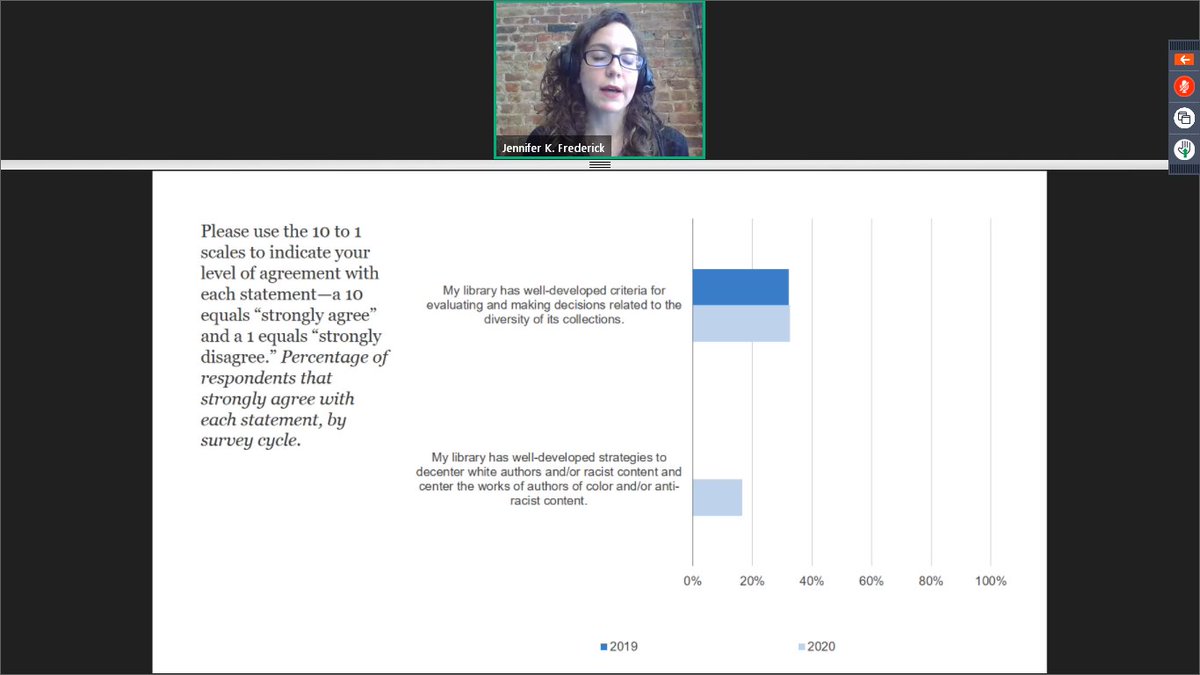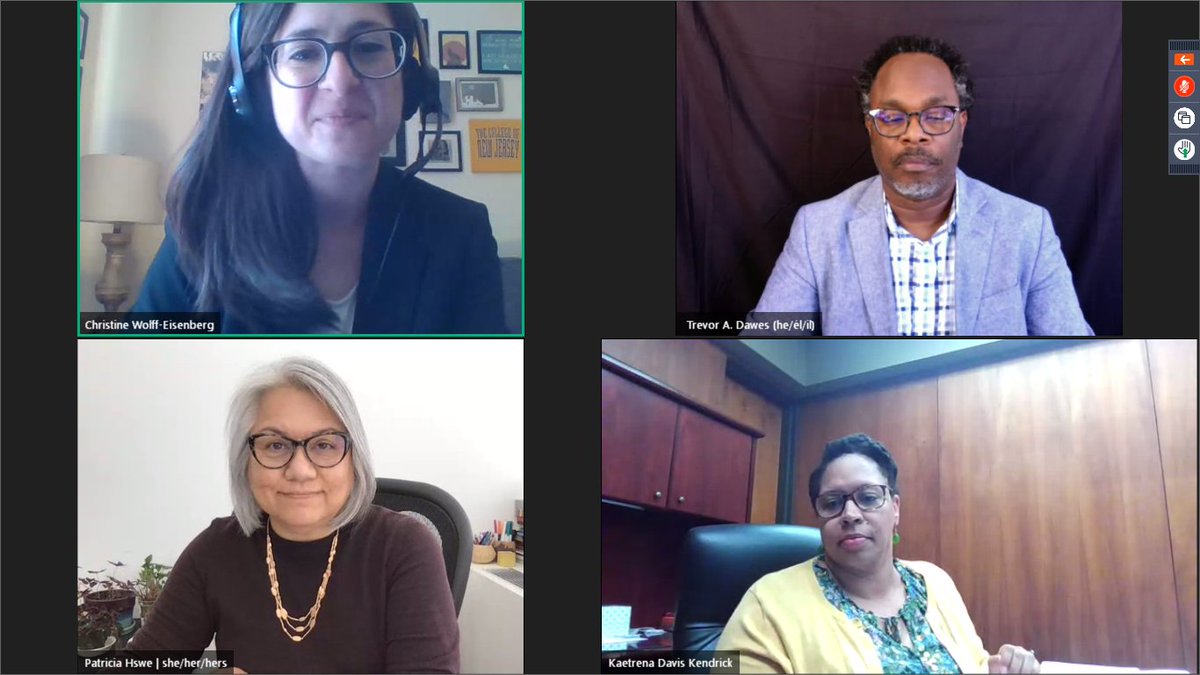This afternoon, I am attending a panel discussion on national movements for racial justice and academic library leadership with @tadawes @Kaetrena @pmhswe @JenKFrederick @cwolffeisenberg and will be tweeting a bit in this thread. #LibJusticePanel https://twitter.com/IthakaSR/status/1381991673320898561">https://twitter.com/IthakaSR/...
To kick things off, @JenKFrederick is speaking about selected findings from the @IthakaSR Library Survey. The second report, focused on movements for racial justice and their implications on academic libraries, is available here: https://sr.ithaka.org/publications/national-movements-for-racial-justice-and-academic-library-leadership/">https://sr.ithaka.org/publicati...
Ability to foster DEIA jumped 3x as a top library director skill between 2019 to 2020 -- even though it was one of the least selected skills. #LibJusticePanel
Most library directors do not think their organizations have well-developed DEIA/anti-racism strategies. #LibJusticePanel
Job types with relatively greater percentages of employees of color were more impacted by recent furloughs and role eliminations. #LibJusticePanel
The vast majority of directors do not believe their institutions have a well-developed strategy for increasing the diversity of their collections. Even less confident in their strategies related to collections than in their strategies related to personnel. #LibJusticePanel
Dawes: I probably would have been surprised if the results were different than they are. Today, there is a more of a focus on DEI, anti-racism, and social justice language. That many directors do not feel equipped to address these concerns is also not surprising. #LibJusticePanel
Dawes: This work requires time and resources -- all of which are in short supply -- which is the case only if these issues are not a priority. #LibJusticePanel
Dawes: Some libraries are building capacity in their organizations by hiring leadership roles for anti-racism and diversity. #LibJusticePanel
Dawes: Anti-racism and representational diversity are not the same thing. For the latter, we have recruitment strategies, but they rarely extend to retention. We can see this in the lack of growth in representation. #LibJusticePanel
Hswe: The question about director skills. Is there a connection between decrease in communication skills and increase in ability to foster DEI? #LibJusticePanel
Hswe: Many libraries released anti-racism statements last year. I was hoping to see more strategies in place to address these issues in libraries. Change happens very slowly in libraries. Yet directors say they have change management skills. Speed matters. #LibJusticePanel
Kendrick: I am not surprised but I continue to be concerned. Given my concerns about morale, I am concerned that leaders aren& #39;t mindful of who is impacted by their policies. #LibJusticePanel
Kendrick: Fostering change is process oriented. But if we want to center EDI, then EDI is about people -- not process. And we need skills like cultural competence. There is a disconnect in what skills are valued vs needed. #LibJusticePanel
Wolff-Eisenberg: Do you see library director roles reshaped around DEI skills and how might this happen? #LibJusticePanel
Hswe: Understanding how to operationalize anti-racist, anti-sexist, anti-homophobic practices across the organization and through co-leadership approaches. #LibJusticePanel
Hswe: Leadership practices call for empathy, humility, and being willing to cede leadership and exhibit humility. #LibJusticePanel
Hswe: It& #39;s not the time to shy away from this conversation. It is the time to have this conversation. #LibJusticePanel
Kendrick: We need resources going not just to recruitment but to advancement. So that Black and brown colleagues advance to leadership. #LibJusticePanel
Kendrick: We need to acknowledge that not everyone wants to do this work. Not all of us want to be engaged in this work or think it& #39;s valuable. We need to move forward for those who are on board. #LibJusticePanel
Kendrick: Diversity statements -- while abuse and neglect is allowed to continue -- create significant cognitive disconnect. You abuse me and then come back to me to ask to do work, which then you say doesn& #39;t matter on my tenure dossier. #LibJusticePanel
Kendrick: We say diversity is important but we treat it as an extracurricular activity. #LibJusticePanel
Dawes: If you don& #39;t really value social justice and racial equity, don& #39;t say you do. I& #39;d much rather know what you believe in and stand for than listen to lip service. #LibJusticePanel
Wolff-Eisenberg: How do you interpret director responses on diversifying their collections? #LibJusticePanel
Kendrick: We& #39;ve had increasingly expansive conversations about decolonizing collections. I& #39;m confounded that the strategies for doing so don& #39;t keep up. #LibJusticePanel
Dawes: We need diverse collections that are going to be used. We need collections where users see themselves in and that are broadly representative. We also want them to add value to our community. So our **curricula** need to incorporate diverse voices. #LibJusticePanel
Hswe: There are structural issues related to collection development. Think about the staff with these responsibilities, and the budget devoted to them. It& #39;s a large portion of the library& #39;s employees and budget. Who gets to select matter. #LibJusticePanel
Dawes: Delaware is embarking on an anti-racism audit initiative. https://sr.ithaka.org/blog/launching-an-anti-racism-talent-management-audit/">https://sr.ithaka.org/blog/laun... #LibJusticePanel
Hswe: The Foundation is broadening the kinds of organizations to which we make grants. Thinking about community college libraries, public libraries, prison libraries. etc. #LibJusticePanel
Hswe: Perhaps an underrepresented person will be more likely to see themselves represented not in an academic library but in a public library or community archive. We are thinking about how to center the history of the underrepresented. #LibJusticePanel
Hswe: What would it look like to have a budget that reflects at DEIA strategy? #LibJusticePanel
Kendrick: Our libraries are toxic & dysfunctional & our colleagues are being abused & neglected. We need to resist white supremacist workplace practices. For example, not to work in urgency, to resist the written word as primary, etc. Create psychological safety. #LibJusticePanel
Kendrick: I am a person of action. I would rather do something than write another statement. Then we can put out a report of what we have done. #LibJusticePanel
Kendrick: Place, purpose, value, and belonging are values that can move the dial on DEI. #LibJusticePanel
Kendrick: @UNC_Librarian is offering the IDEA Action Internal Grant. That is an interesting initiative to watch. Incentivizing the work. #LibJusticePanel
Q: What does the committee think about the DEI committees in our libraries? How can supervisors of committee members support them? How to address failure to participate? How to reward and recognize? #LibJusticePanel
Kendrick: What BIPOC really need is time away from this work. Give them time away. It& #39;s a weathering of the spirit, mind, body. Passion weathers people. #LibJusticePanel
Dawes: Organizational readiness is a process. I& #39;ve been a Delaware for four years. It& #39;s taken us this long to be at the place where we can do this. @Kaetrena talked about "legacy toxicity" - there& #39;s ground work to remove that toxicity before you can more forward. #LibJusticePanel
This was a wonderful panel. Thank you @tadawes @pmhswe @Kaetrena, as well as my colleagues @JenKFrederick & @cwolffeisenberg. Thanks to everyone who attended and tweeted. #LibJustice #LibJusticePanel

 Read on Twitter
Read on Twitter